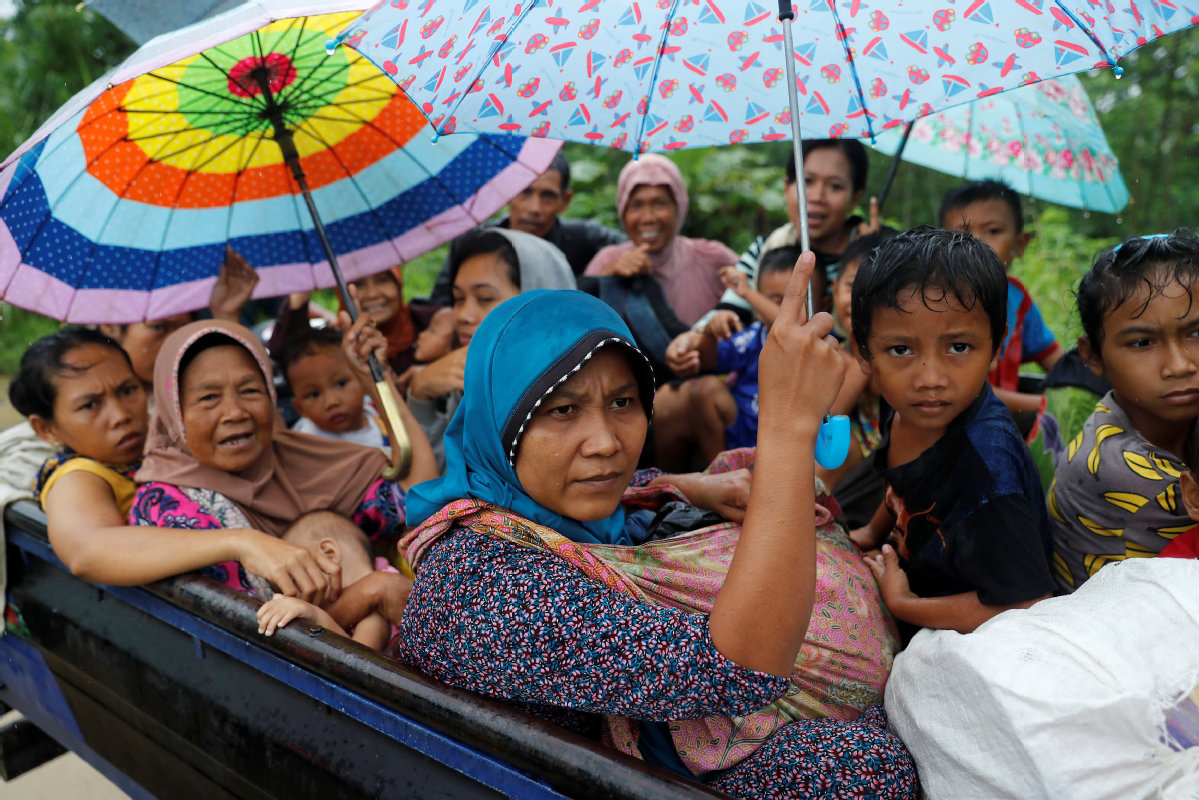Indonesian rescuers struggle to reach tsunami-hit villages


Locals have been told to keep a safe distance from the coast in case of further waves
SUMUR, Indonesia - Indonesian rescue teams on Wednesday struggled to reach remote areas on the western coast of Java amid an "extreme weather" rain warning after a tsunami killed more than 400 people last week.
Heavy rain lashed fishing villages along the coast, muddying roads and holding up convoys delivering heavy machinery and aid to isolated areas while authorities urged residents to stay away from the shore in case of further waves.
Clouds of ash spewed from the nearby Anak Krakatau, or child of Krakatau, almost obscuring the volcanic island where a crater collapse at high tide on Saturday sent waves up to 5 meters high smashing into the coast on the Sunda Strait, between Java and Sumatra islands.
Indonesia's meteorology agency (BMKG) said the rough weather could make the volcano's crater more fragile.
"We have developed a monitoring system focused specifically on the volcanic tremors at Anak Krakatau so that we can issue early warnings," said BMKG head Dwikorita Karnawati, adding that a 2 km exclusion zone had been imposed.
The agency also asked people late on Tuesday to stay at least 500 meters and up to 1 km from the coastline along the strait, which lies between the two main islands. Government workers were monitoring Anak Krakatau's eruptions and high waves and heavy rain were possible on Wednesday, Karnawati said.
"All these conditions could potentially cause landslides at the cliffs of the crater into the sea, and we fear that could trigger a tsunami," she said at a news conference. She asked that communities remain vigilant and not to panic.
The confirmed death toll is 430, with at least 159 people missing. Nearly 1,500 people were injured and over 21,000 people have evacuated to higher ground.
A state of emergency has been declared until Jan 4, which authorities hope will make it easier to deploy assistance, said Sutopo Purwo Nugroho, spokesman for the national disaster mitigation agency.
The disaster agency dispatched helicopters to drop supplies into hard-to-reach communities, while hundreds of residents on tiny islands in the Sunda Strait were airlifted or taken by boat to shelters.
"We tried to stay because it's our island, but after a while we got scared," said Sariyah, a 45-year-old resident of tiny Sebesi island, who evacuated to the mainland on a boat.
Sniffer dogs are being used to find those still missing as grief-stricken relatives lined up at identification centers.
But hopes of finding any survivors beneath the rubble have dwindled.
Tubagus Cecep, 63, waited nervously at the area's main identification center to see if a body was that of his missing son.
"I'm scared my son is dead, but if I keep my faith in God maybe he could have been swept away somewhere and is still alive," he said.
At the Tanjung Lesung resort, cars and minibuses had been thrown against buildings, concrete walls cracked into small pieces and uprooted trees spread around. A wooden sign that read "Good Times" lay on the ground.
The tsunami struck the resort as more than 200 workers from the state electricity company were watching pop band Seventeen perform.
The four-member group was hurled from the stage as the water slammed into the audience-only the band's lead vocalist survived.
On Wednesday, thousands prayed for loved ones at mass graves and mosques to mark the 14th anniversary of the 2004 Boxing Day tsunami, which killed about 220,000 people in countries around the Indian Ocean.
Reuters-AP

































